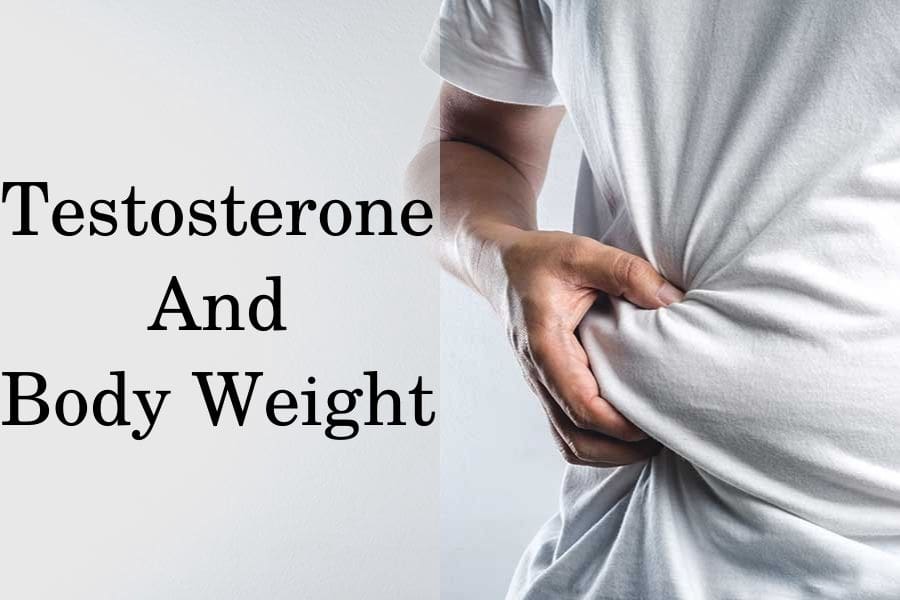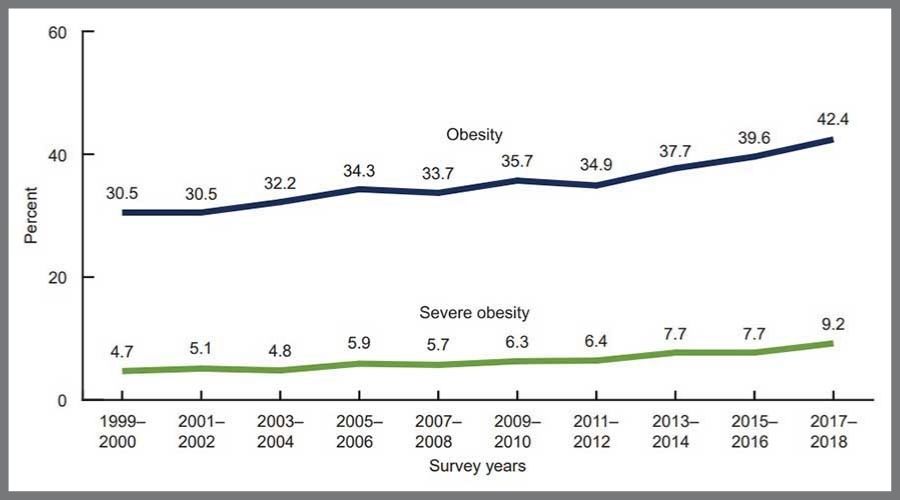As you age, you become more likely to gain weight for two main reasons – your physical activity decreases and your metabolism slows down.
One of the factors affecting your metabolic rate may be the changes in your hormonal environment, such as the age-related decline of testosterone in men.
Furthermore, medical conditions that affect testosterone levels can lead to dramatic metabolic changes and rapid weight gain.
Weight gain can be the underprint for many instances of hormonal imbalance. Its incidence keeps increasing and it has reached a whopping 43% of all US adults in the last few years.
Obesity can lead to low T and an increased risk of erectile dysfunction in men. In women, obesity causes high T levels and the development of male characteristics (virilization).
Therefore, there is a complex relationship between weight gain and changes in testosterone levels. We’ll tell you the whole truth.
How low testosterone causes weight gain in men
According to research, low testosterone in men is associated with a specific type of obesity called visceral. Visceral fat is an accumulation of intra-abdominal fat that builds up around the internal organs and plays a role in insulin resistance, inflammation and atherosclerosis.
Therefore, low T in men may increase the risk of obesity and related conditions such as type 2 diabetes and cardiovascular disease.
Low T often leads to loss of muscle mass which is likely the main underprint for the lower metabolic rate in testosterone deficiency
This can make it more difficult for you to lose fat, even if you follow a weight loss diet and exercise regime. Less muscle mass also results in lower energy expenditure during physical activity and sports.
On the other hand, obesity can be a major cause of reduced T production in otherwise healthy men. According to a study on 1 667 men, the effects of having extra fat are more significant than the age-related decline of T in men.
The scientists estimated that an increase in body mass index (BMI) with one unit resulted in a 2% decline of T levels, which is comparable to that associated with approximately 10 years of aging.
One of the underlying mechanisms is that obesity increases the activity of the aromatase enzyme which is found in your adipose tissues. It leads to increased testosterone aromatization and converts more testosterone into estrogens (E).
As your body produces more estrogens, the hormone suppresses the function of the hypothalamic-pituitary-testicular (HPT) axis.
Without HPT stimulus, the testes can’t produce sufficient amounts of T, which may lead to testosterone deficiency (hypogonadism).
Therefore, some researchers define the condition as male obesity-related secondary hypogonadism.
Reduced testosterone production may also occur due to the increased levels of insulin and leptin in obese men. They can suppress the release of gonadotropin-releasing hormone (GnRH) and the HPT axis which leads to low T.
Total testosterone levels are usually more severely affected than free T levels in men since obesity and high insulin levels lower a protein called sex hormone-binding globulin (SHBG).
How high testosterone makes women gain weight
Women with obesity and hyperinsulinemia also experience a decrease in SHBG. This leads to elevated free T levels and the development of conditions such as polycystic ovary syndrome (PCOS).
High T is one of the hallmark signs of PCOS in women. It may lead to the occurrence of acne, a deeper voice, increased body, and facial hair growth, and other masculine physical characteristics.
On the other hand, high T is unlikely to cause obesity or insulin resistance in women. Studies are conclusive that elevated testosterone levels are the result rather than the cause of high insulin and weight gain.
Nevertheless, some hormonal changes during menopause can increase the risk of obesity.
The related decline of estrogen may lead to changes in the hormones controlling hunger, resulting in increased appetite, higher intake of calories, and weight gain.
Furthermore, menopause often involves the accumulation of intra-abdominal fat and visceral obesity, which leads to the development of a typical “hormonal” or “menopause belly”.
Visceral obesity in women also increases the risk of type 2 diabetes and cardiovascular diseases.
Get a free consultation with our medical expert for any questions about hormone replacement therapy



